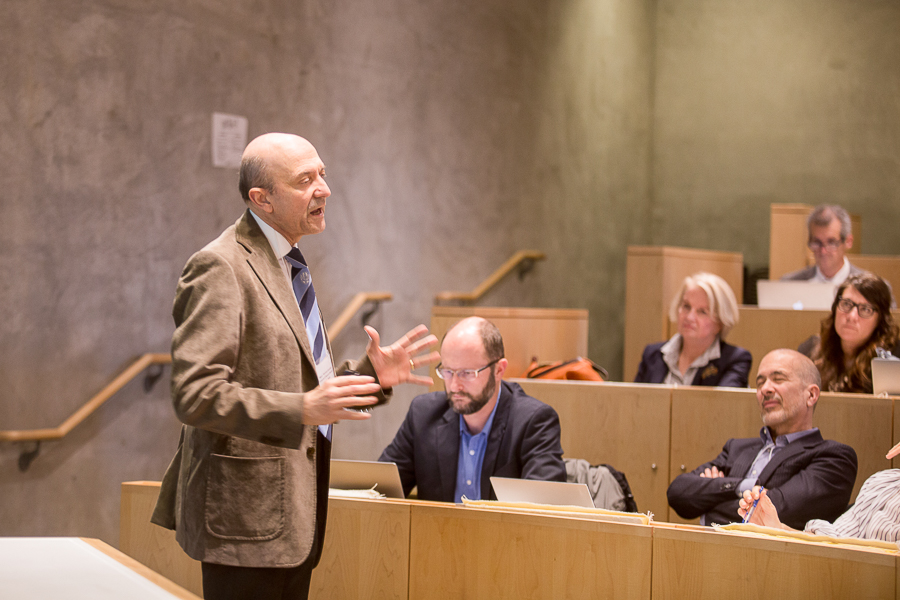
UC Davis hosts International Olive Oil Conference to discuss efficacy of olive oil in reducing risk of major diseases
For the first time since 2001, the International Olive Oil Institute met to present research on the health benefits of olive oil at the UC Davis Olive Center. Located at the Robert Mondavi Institute for Wine and Food Science, the conference, hosted by the International Olive Oil Council, consisted of scientists from across the United States as well as representatives from research institutions in Spain and Italy. Studies on the health benefits of olive oil consumption in relation to obesity, vascular health and diabetes were presented in conjunction with the effect of olive oil consumption and its relation to major diseases.
Representatives from the consumer side of the industry were also present to hear more about what kind of research is going on in the field and to speak with experts and researchers about their findings and opinions. One representative was Takatoshi Yamashita, a senior manager of a product development laboratory for J-Oil Mills, Inc., one of the largest manufacturers of olive oil in Japan. His expertise is in chemistry and the analysis of a compound in olive oil called oleocanthals that he, among other researchers, has found to have profound effects on appetite. When olive oil is consumed, oleocanthals bind with receptors in the digestive tract, which effectively reduce appetite. Olive oil consumption has also been linked to reduction in the development of cancer and Alzheimer’s.
Ed Blanz, a UC Davis alumni who works in the field of forensic nutrition, also attended the conference. Blanz, in association with the company that he works for in the Bay Area, investigates the questionable claims that companies and researchers make about food products.
“I usually work with health products and dietary supplements where people are making questionable claims about what their product will do for people’s health,” Blanz said. “Their science comes to me, I analyze the research, write a paper, and help to regulate the industry.”
Blanz also has a faculty position at UCSF and has travelled the world speaking about olive oil.
The meeting of researchers at the International Olive Oil Conference this year showed the many ways that olive oil influences society, from the market to our health.
The conference showcased presentations such as one given by Manuel Franco, a researcher from the University of Álcala and the Johns Hopkins Bloomberg School of Public Health, who explores the presence of healthy diets in relation to economic status in different places around the world.
There is more to olive oil than just its health benefits. Franco presented research on the affordability of foods within the Mediterranean diet and its influence on a healthy diet. He is trained in the analysis of food availability in cities and its correlation to diet and health.
“If you move from city to city, you eat differently,” Franco said. “Why is that? And how is that related to your health?”
The Mediterranean diet is one of the healthiest non-restrictive diets around. A non-restrictive diet is one that does not enforce a strict regimen of what to eat on the dieter. There is no set type of food that the Mediterranean diet calls for, but it does call for olive oil to be used in replacement of salad dressings and other types of oil. It operates on the idea that people who rely mainly on olive oil for their caloric intake are healthier than people who do not. The consumption of olive oil also has a close relation to high consumption of vegetables.
Jean-Xavier Guinard, a UC Davis professor of Food Science and Technology, is a sensory scientist and food researcher who, among other research, studies the perception of olive oil in the eyes of consumers. Guinard is also the interim director for the study of wine and food science at UC Davis and co-hosted the International Olive Oil Conference with the Mondavi wine and food center. He focuses on the sensory aspects of olive oil, particularly its taste.
“The nature of the fat we consume is highly relevant to our health,” Guinard said. “But the context of olive oil compared to other fats and oils shows us that olive oil offers a lot of benefits. It’s time for us to talk about nutrition and health in terms of the qualities of food. But this must be done in combination with flavor and what tastes great to us. Olive oil fulfills all of these requirements, and it is also a sustainable source of energy.”
California and UC Davis play an important role in the regulation of the olive oil industry since both the state’s agricultural infrastructure and the university’s research have influenced the perception and understanding of both its benefits and functions.
The UC Davis agricultural program grows olive trees and has a yearly harvest that is well known in California and abroad for the high quality of olive oil that is produced. Students can get involved every year in the Fall to witness the process and take home some olive oil for themselves.
Written by: Jason Kelly — science@theaggie.org







